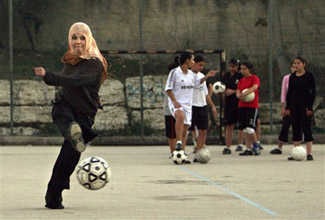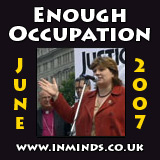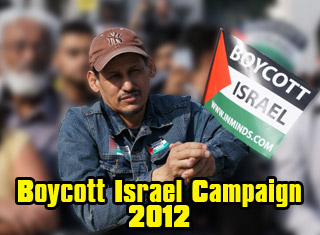
 Innovative Minds © 2014. All Rights Reserved. www.inminds.co.uk | ||||
For Palestinian women soccer players, a field is a dreamBy Amelia Thomas, Correspondent of The Christian Science Monitor The national team holds practices on concrete in preparation for a January tournament. BETHLEHEM, WEST BANK â It's a chilly late afternoon in Bethlehem. Along quiet streets, grocers are hastily packing away vegetable stalls; colorful Christmas decorations glint in shop windows. And, on a steep hill at the edge of the Bethlehem University campus, a group of 12 young Palestinian women are braving the cold for a precious once-weekly ritual: soccer practice.
Several girls have been hurt playing on the concrete practice field. The only real soccer field in the West Bank is in Jericho, just 18 miles away, but largely inaccessible due to a string of stringent Israeli military checkpoints.
The women, between the ages of 14 and 22, make up the majority of the Palestinian Territories national women's soccer team, which meets on an improvised concrete soccer field every Wednesday, rain or shine. Currently, they are working hard in preparation for their next tournament, despite lingering questions over whether they will be able to attend. "We hope," says Samar Araj Mousa, Bethlehem University's athletic director who founded the team in 2003, "that we will play at the second Arab Women's Football Championship in Abu Dhabi in January." Tight travel restrictions and severe financial difficulties may keep the team from competing for their homeland. The girls, under the eagle eye of volunteer coach Emil Hilal, a sports teacher at a nearby high school and a one-time local soccer star, form a line on the playing field, their breath billowing clouds in the cold air. They begin ducking, weaving, dribbling, and shooting, as Mr. Hilal yells instructions. An excited cheer goes up as goalkeeper Nadeen Khaleeb throws herself fearlessly to the ground, successfully defending her makeshift goal posts. "They're doing their best," says Hilal, "but they don't have the facilities or the equipment to be as good as they could be."  Nevin Kleib of the Palestinian Territories national women's soccer team playing on a concrete soccer field
But the hurdles are not just financial. Several girls have been hurt playing on the concrete practice field. The only real soccer field in the West Bank is in Jericho, just 18 miles away, but largely inaccessible due to a string of stringent Israeli military checkpoints. For some, the strain of travel is too much: The team's former coach resigned last year after returning from the West Asian Women's Football Championships in Jordan. Detained and interrogated for hours at the border by both Israeli and Jordanian authorities, he found the experience too traumatic to repeat.
The team's former coach resigned last year after returning from the West Asian Women's Football Championships in Jordan. Detained and interrogated for hours at the border by both Israeli and Jordanian authorities, he found the experience too traumatic to repeat.
"The girls," says Ms. Mousa, "sat crying at the border, knowing they'd missed their game." Fortunately, they were able to reschedule the game for the next day. So why, despite the manifold difficulties, is soccer the girls' game of choice? For Mousa, it's a combination of factors. "It's good for their health," she says, "for their stamina and their endurance. They also make strong friendships, and it teaches them principles of sportsmanship. And," she adds, "soccer represents their only chance to go abroad." But for most of the girls on the team, a mix of Muslims and Christians, soccer is more than a form of exercise or a way out of the West Bank: It's a way of life. "Football has been my passion since I was small," says team captain Honey Thaljieh, a Bethlehem University graduate in business administration. "First I played with my brothers on the street, then on boys' teams at school." Her bedroom, she says, is plastered with pictures of her favorite team, Brazil, and its star player, Ronaldinho. "Our society has a very male-centered mentality," she continues, "but we're showing women there's a different way. Step by step, from the inside, we're changing things around."
Opportunities for the entire national team to play together are extremely rare. The handful of team members from Ramallah and the Gaza Strip can't come to practices in Bethlehem. They train locally, often with fewer resources and even less support than the girls in Bethlehem. The team can meet and play together only at overseas championships.
"I feel powerful when I'm playing soccer," says Amira Hodaly, who studies physical therapy at Bethlehem University, "I started when I was 10, playing alongside my brothers. Now that I'm older, it's less accepted than when I was just a child. But," she adds, smiling, "I don't care." Though many of the players have been teased by their male peers for their soccer passion, most have received support and encouragement from their families. Ghada Hodeli, a university accounting student, is engaged to be married. Although her fiancé doesn't play soccer himself, he understands why she does. Several other players, however, have had to deal with a more disapproving response. "My parents don't really like me playing," says Sarab Shair, a 21-year-old Muslim who grew up in a children's home and was later adopted by a local family. "But they don't have a choice.... They also want me to wear the veil if I have to play at all, but I've refused that, too." Instead, like most of the girls, she plays in shorts and T-shirt, her hair swept back into a ponytail. Some other Muslim players, like Navin Kaleab, sister of goalkeeper Nadeen, play in long sleeves, pants, and a head scarf. But it does not affect her performance, she says with a soft smile. Though the local Hamas administration supports the team in theory, Mousa notes that the authorities have advised that the team cover up and play indoors, away from male spectators. So far, the team has not been forced to do either. Opportunities for the entire national team to play together are extremely rare. The handful of team members from Ramallah and the Gaza Strip can't come to practices in Bethlehem. They train locally, often with fewer resources and even less support than the girls in Bethlehem. The team can meet and play together only at overseas championships. The first such opportunity came last year at the West Asian women's football championship in Jordan. "It was a strange experience," recalls Hilal, "the team playing a game together without even knowing each other's names." Not only was it their first time playing on grass, it was their first game as a full 11-member team. "But even so, the girls did well as beginners," Mousa says. "They played against the Egyptian national team, and though they lost, it wasn't by a big margin. In the future, it will only get better." If they do manage to attend the Abu Dhabi championships in January, the team aims to prove its potential against its professional, well-financed competition. By 5:30 p.m., dusk is falling in Bethlehem. On the horizon, a vivid pink sky hangs above the looming concrete "security barrier," which snakes across the countryside below. As the field slips into darkness, the girls pile into two cars waiting to drive them home. "Although we can't yet compare with many other clubs, other teams are still quite scared to play against us," says Thaljieh cheerfully, as muezzins and church bells start to echo in the evening air. "We might not have the facilities that they have, but they know we have the ability, the courage, and the determination to win. And, one day, we will."
Source: http://www.csmonitor.com/2006/1204/p14s02-alsp.html?s=hns Also Of InterestPage URL: http://www.inminds.co.uk/article.php?id=10002
|
|
Support Us
If you agree with our work then please support us.Campaigns INMINDS Facebook Live Feed Latest Video's
INMINDS Twitter Feed Tweets by @InmindsComFeatured Video's
You need Flash player 8+ and JavaScript enabled to view this video.
[all videos (over 200)..] Featured MP3 Podcast  "I went to the Palestinian village, and I saw there were houses, they were being pulled down because there werenât any permits for the Palestinian homes. And through the rubble and through all the dust I could see [the illegal israeli settlement of] Har Homa shinning in the distance with its permission for another 1000 units." Member of Parliament Enough Occupation Rally, June 2007 [4min / 2Mb] [all podcasts..] Newsletter Feedback |
 |
 |
















































